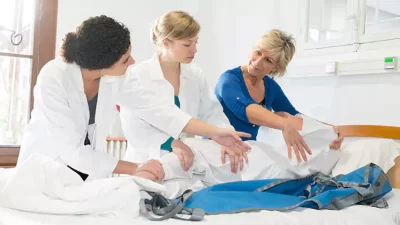Joint pain or arthritis is often described as a burning sensation in your joints, and it affects millions of people globally[1].
Arthritis can be a result of the natural deterioration of bone density, chronic illnesses such as lupus, or a result of personal lifestyle habits which may include but are not limited to:
- Obesity
- Lack of exercise and stretching
- Poor diet
- Stress
- Inadequate sleep
- Incorrect posture
- Unsupportive footwear
All these factors are linked[2]. If you make a few changes as suggested below, the pain you’re experiencing may be eased.
#1. Obesity
All adults have the same skeletal structure. Being overweight places strain on the weight-bearing joints, such as the hips, knees, and ankles.
Being heavier also causes inflammation in the body which may result in secondary joint pain in, for example, the hands.
#2. Exercise and stretching
Bone density reduces with age[3], meaning that strength training and stretching are important.
Strength training causes small tears in the muscle as well as stressing the bone, forcing themselves to repair.
Adding weight or resistance exercises to your regimen can increase new bone growth by between one and three percent.
Stronger musculature aids stability, which decreases the likelihood of injury. If you can’t manage strength training, water aerobics is a good, low-impact alternative.
Always stretch before your workout as it will boost blood flow, prepare muscles for exercise, and lubricate your joints.
Stretching after a workout allows for less stiffness the day after you’ve trained, giving you more range of motion.
#3. Diet
Omega 3 and 6 fatty acids are essential to joint health. The American Heart Association recommends eating fatty fish such as lake trout, salmon, mackerel, sardines, albacore tuna, and herring twice a week.
You can also add blackcurrants, pistachio nuts, pumpkin seeds, and acai berries to your diet, as these contain Omega 6 gamma-linolenic acid (GLA), another helpful fatty acid.
Pineapple contains bromelain which counters lactic acid build up in the body. Adding it to your diet will reduce stiffness after exercise. As such, some patients eat pineapple after surgery as it reduces pain and swelling.
Turmeric and ginger are useful spices, both with anti-inflammatory properties. Adding them to your food may reduce pain and swelling.
Turmeric is also helpful in weight management as it improves your metabolism, and ginger has detoxifying properties[4].
#4. Stress
Many people are prone to comfort eating during times of stress which may lead to weight gain, placing strain on the joints.
Seek alternative methods to reduce stress, such as exercise or mindful breathing.
By focusing on something positive, inflammation may decrease, meaning you’ll experience less pain.
Physical therapy can also be beneficial as the specialist will perform techniques on you that will result in improved mobility over time.
#5. Sleep
Quality sleep does not only contribute to weight maintenance, energy resources, healthier caloric intake, and stress alleviation, it also assists in joint support.
Some fields of research have shown that joint pain and restless sleep are linked.
Begin to practice good sleep hygiene by avoiding caffeine and heavy meals at least one hour before bed. Also, turn off all mobile devices.
Stomach sleepers may be more prone to painful joints as their spine is compressed which leads to back pain. Back pain is one of the main reasons middle-aged people begin to lose mobility.
To relieve this, we suggest sleeping on the side or back, as these positions are more comfortable and conducive to improved posture and spinal health.
If you’re prone to backaches, sleeping on a medium-firm mattress may offer some relief – as medium-firm beds are often the best mattresses for back pain relief.
A useful tip to keep joints loose is to warm the bed with an electric blanket prior to settling down for the night.
#6. Posture and ergonomics
Many desk employees suffer from joint pain. This is often because they do not have a suitable office set-up.
Ensure that your chair is adjustable and that your feet are flat on the floor.
Crossing your legs while seated places strain on your hips and spinal alignment.
Avoid hunching over to see your computer or write at your desk. And remember, always sit up straight.
#7. Footwear
Wear sensible shoes that adequately support your feet and ankles. If you take part in physical activity, wear the right shoes.
For example, tennis players need shoes that support their ankles, preventing them from rolling and sustaining an injury.
Pointed tips place your feet in an unnatural position, which may result in arthritic toes.
Wearing high heels daily may result in ankle pain as your ankles are slightly misaligned during wear.
Avoid wearing slippers and sandals for extended periods too as they do not offer sufficient foot and ankle support.
By following these suggestions, you may not entirely stave off joint pain, but you will start to maintain your overall health and that may prolong its onset while improving comfort.







 This article changed my life!
This article changed my life! This article was informative.
This article was informative. I have a medical question.
I have a medical question.
 This article contains incorrect information.
This article contains incorrect information. This article doesn’t have the information I’m looking for.
This article doesn’t have the information I’m looking for.